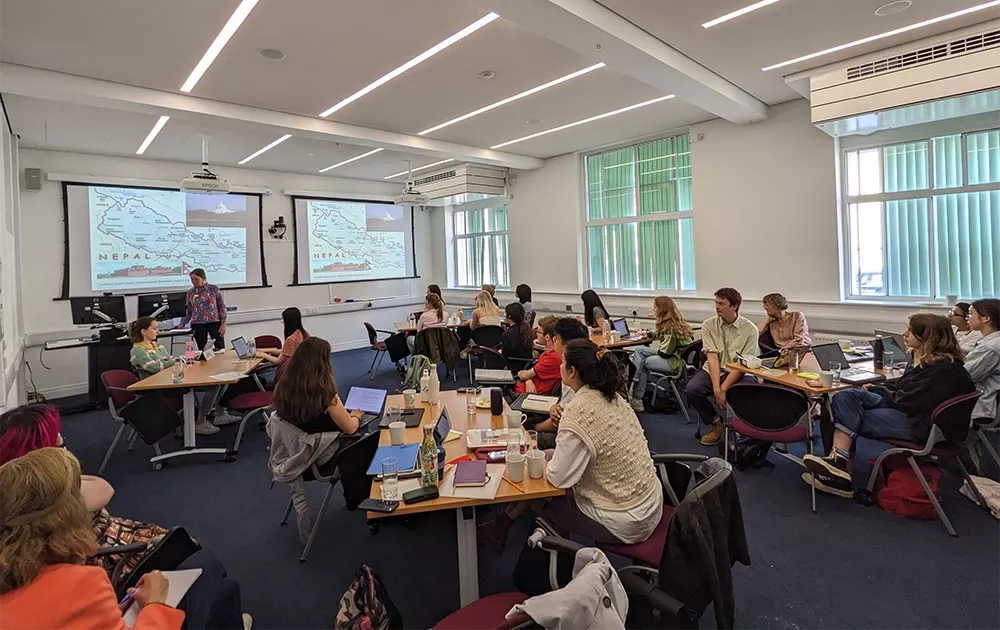Thinking Care-fully with Method Workshop: Facing the Discomfort in Research

Researchers face ethical dilemmas in every step of the research process, often unforeseen despite our best efforts of anticipation in the research design. Many complex ethical questions arise from the best intentions of producing inclusive and responsible research while avoiding harm to participants and researchers. These questions become more salient with the emergence of diverse creative and innovative research methods in the field, such as 'go-along', visual, and digital methods.
Responding to the ethical and practical challenges in qualitative research, Dr Jennie Middleton, Dr Rosalie Warnock, and Professor Gillian Rose convened a two-part workshop on Thinking Care-fully with Method at the University of Oxford's School of Geography and the Environment in May. The workshop aimed to collectively think through how to extend the feminist ethic of care, reciprocity, respect, and responsibility in our research methods. The discussion also urged us to design and carry out research methods that are sensitive to the diverse needs of research participants such as children, disabled people, and other marginalised groups who might experience exclusion due to complex intersections of race, class, gender, and sexuality.
The workshops were attended by a mix of academic staff, postgraduate and undergraduate students, online and in person. Speakers were invited to talk about best practices as well as unexpected challenges in various research methods. The workshop participants then engaged in smaller group discussions to reflect on the presentations.
During the first part of the workshop, Prof Helen Lomax (Department of Education and Community Studies, University of Huddersfield) and Dr Josie Hamper (School of Geography and the Environment, University of Oxford) shared their experiences with visual methods. Their presentation was followed by Dr Jim Kauffman (School of Business and Society, University of York) and Dr Alice Watson (School of Geography and the Environment, University of Oxford) who spoke about digital methods.
The second workshop was joined by Dr Morag Rose (School of Environmental Sciences, University of Liverpool) and Dr Daniel Munoz Zech (Faculty of Architecture and Urbanism, Universidad de Chile) who recounted their experiences of working with mobile methods in public spaces. Dr Giovanna Gini (School of Geography, Queen Mary University of London) and Dr Hannah Macpherson (Institute of Development Studies) then reflected on their use of creative and playful methods.
Despite the breadth of methods, topics, and contexts presented by the speakers, several common themes emerged from the workshops. There is a clear temporal aspect in embodying care ethics in research. It takes time to build and sustain trust and empathy between researchers and research participants, while also negotiating the boundaries of the researcher-participant relations. Meanwhile, the research life cycle itself has a temporal dimension of starting, happening, and ending which requires researchers to anticipate responsible exit strategies and the afterlife of the research even from the beginning especially as greater emphasis is placed on public engagements and research impact.
Yet, the ability to anticipate during the process of designing research methods will always be confronted with the unexpected realities of the field. Researchers are challenged to be flexible in adapting the research methods to appropriately respond to the challenges with ethics of care. This flexibility is required in data collection in the field, data analysis, translation of findings into academic outputs, public engagement, and decisions on how we present findings from the research with respect to the research participants.
The process of adapting research to respond to ethical issues brings tension and discomfort that reflect the challenges of thinking care-fully about research methods. The discomfort comes from acknowledging the inherent power dynamic between researchers and participants. While power imbalance may not be dissolved, the discomfort encourages us to be reflective of our position in research and our responsibilities to research participants.
The workshops raised various issues that are relevant to qualitative research. While there is no clear solution, and there can never be any one solution as ethical decisions will ultimately always be contextual, a feminist ethics of care can help guide us to become more responsible researchers.
Felippa Amanta is a doctoral research student in the School of Geography and the Environment.
Thinking Care-fully with Method Workshop: Facing the Discomfort in Research
Researchers face ethical dilemmas in every step of the research process, often unforeseen despite our best efforts of anticipation in the research design. Many complex ethical questions arise from the best intentions of producing inclusive and responsible research while avoiding harm to participants and researchers. These questions become more salient with the emergence of diverse creative and innovative research methods in the field, such as 'go-along', visual, and digital methods. Responding to the ethical and practical challenges in qualitative research, Dr Jennie Middleton, Dr Rosalie Warnock, and Professor Gillian Rose convened a two-part workshop on Thinking Care-fully with Method at SoGE in May.






